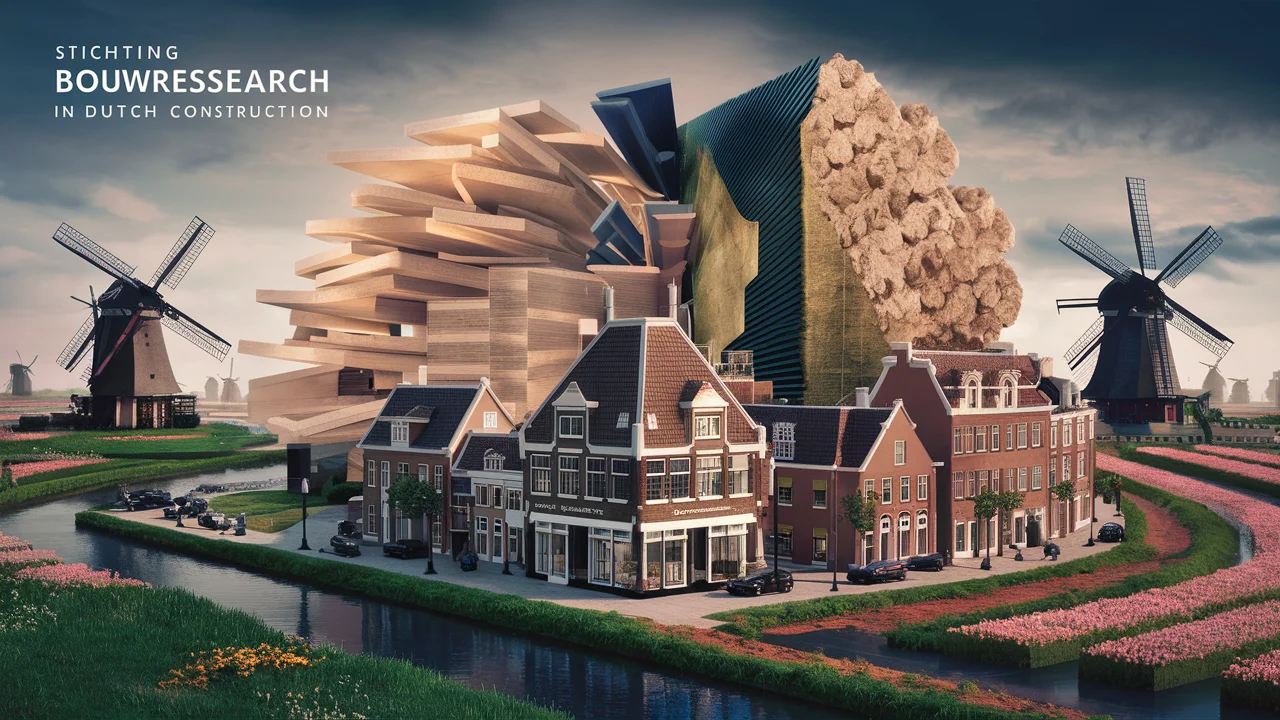The construction industry in the Netherlands has long been recognized for its innovation and commitment to quality, largely due to the contributions of Stichting Bouwresearch (SBR). This organization has been a cornerstone in promoting advanced building practices, sustainable construction, and the dissemination of vital knowledge within the Dutch construction sector.
- SBR was founded with a clear mission to elevate the standards of construction in the Netherlands, ensuring that every building project adheres to the highest levels of quality and innovation.
- Through decades of dedicated research and collaboration, SBR has influenced countless aspects of Dutch construction, from developing new building techniques to setting industry standards.
- The legacy of Stichting Bouwresearch is not just a historical footnote but an ongoing influence that continues to shape the future of construction in the Netherlands.
Understanding the history and impact of Stichting Bouwresearch is essential for anyone involved in the construction industry today. Whether you’re a seasoned professional or just beginning your career, the lessons and innovations brought forth by SBR can serve as a guiding light in your work. This article will explore the rich legacy of SBR, highlighting its contributions, achievements, and ongoing relevance in the ever-evolving world of Dutch construction. From its founding principles to its modern-day impact, we’ll delve into how SBR has helped shape a culture of excellence and innovation within the Dutch construction industry.
Historical Background of Stichting Bouwresearch
Stichting Bouwresearch (SBR) was established in 1945, during a pivotal moment in Dutch history. In the aftermath of World War II, the Netherlands faced the enormous task of rebuilding its infrastructure and housing. The need for innovation in construction was critical, and this environment fostered the creation of SBR. The organization’s founding principles were deeply rooted in the necessity to promote high-quality, efficient building practices that could meet the demands of a rapidly modernizing society.
- Formation and Founding Principles: The immediate post-war period was marked by a shortage of materials and skilled labor, which made the establishment of SBR a strategic move. SBR’s founders, who were key figures in Dutch architecture, engineering, and government, aimed to develop new building techniques that could maximize resources and speed up reconstruction efforts. They sought to introduce standardized practices that would ensure consistent quality across the nation.
- Founding Members and Key Figures: SBR was spearheaded by visionary leaders such as Willem Marinus Dudok, a renowned Dutch architect, and several influential engineers and policymakers. These individuals recognized the need for a centralized body that could guide the industry through research, innovation, and knowledge dissemination. Their collaborative efforts laid the foundation for what would become a vital institution in the Dutch construction landscape.
- Early Challenges and Opportunities: In its early years, SBR faced numerous challenges, including limited funding and resistance from traditionalists within the industry. However, these challenges were met with determination and creativity. The post-war reconstruction provided an unprecedented opportunity for SBR to prove its value by offering practical solutions to the nation’s pressing construction needs. Their work led to the development of cost-effective, durable building materials and techniques that were quickly adopted across the Netherlands.
- Evolution Over the Decades: As the decades passed, SBR evolved in response to changing industry needs and technological advancements. The 1960s and 1970s saw the organization expanding its focus to include not only residential construction but also large-scale infrastructure projects. During this time, SBR’s research began to emphasize sustainability, leading to the introduction of environmentally friendly building practices long before they became mainstream.
SBR’s history is a testament to its ability to adapt and thrive amidst the challenges of a dynamic industry. From its inception in the post-war era to its role in modern construction, SBR has consistently driven the Dutch construction industry forward. The organization’s legacy is evident in the countless projects that bear its influence, from residential neighborhoods to major public works. As we explore SBR’s ongoing contributions, it becomes clear that this organization has been, and continues to be, a pillar of innovation and excellence in Dutch construction.
Core Mission and Objectives of SBR
Stichting Bouwresearch (SBR) was founded with a clear and ambitious mission: to revolutionize the construction industry in the Netherlands. This mission has been pursued through a combination of rigorous research, the development of innovative building techniques, and the creation of standards that ensure quality and efficiency in every construction project. SBR’s core objectives reflect its commitment to advancing the Dutch construction industry by fostering innovation, sharing knowledge, and promoting sustainable practices.
- Promoting Innovation in Construction: At the heart of SBR’s mission is the drive to innovate. From its early days, SBR has been instrumental in introducing new building materials and techniques that have transformed the construction landscape in the Netherlands. Whether it’s pioneering the use of prefabricated elements to speed up construction processes or exploring novel ways to improve building insulation, SBR has consistently been at the forefront of innovation. This focus on innovation has not only improved the quality of buildings but also made construction more efficient and cost-effective.
- Enhancing Knowledge Sharing: SBR has always recognized the importance of knowledge dissemination in driving industry-wide improvements. To this end, the organization has established numerous initiatives aimed at sharing research findings and best practices with construction professionals across the Netherlands. This includes publishing detailed reports, hosting workshops, and offering training programs. By making this knowledge accessible, SBR ensures that even small-scale builders and contractors can benefit from the latest advancements in construction technology and methods.
- Setting Standards and Guidelines: One of SBR’s most significant contributions to the Dutch construction industry has been its role in setting industry standards. These standards, developed through extensive research and testing, provide clear guidelines for everything from material quality to construction techniques. By adhering to these standards, builders can ensure that their projects meet the highest levels of safety, durability, and environmental performance. This standardization has been crucial in raising the overall quality of construction in the Netherlands, making it one of the most advanced in the world.
- Supporting Sustainable and Efficient Building Practices: Long before sustainability became a global concern, SBR was advocating for environmentally responsible construction practices. The organization’s research has led to the development of energy-efficient building materials, water-saving construction methods, and techniques for reducing waste during the building process. SBR’s focus on sustainability extends beyond individual projects, influencing policy and encouraging the entire industry to adopt greener practices. This commitment to sustainability has positioned the Netherlands as a leader in sustainable construction, setting an example for other countries to follow.
SBR’s mission and objectives are deeply intertwined with its ongoing impact on the Dutch construction industry. By promoting innovation, enhancing knowledge sharing, setting rigorous standards, and supporting sustainable practices, SBR has helped shape a construction landscape that is both advanced and forward-thinking. The organization’s work has not only improved the quality of buildings in the Netherlands but also contributed to a more efficient, sustainable, and resilient construction industry. As we continue to explore SBR’s contributions and achievements, it becomes clear that its mission remains as relevant today as it was when the organization was first founded.
Key Contributions and Achievements of Stichting Bouwresearch
Stichting Bouwresearch (SBR) has made numerous contributions to the Dutch construction industry, leaving a lasting legacy of innovation, quality, and sustainability. These achievements have not only transformed the way buildings are designed and constructed in the Netherlands but have also influenced construction practices worldwide. The organization’s work is reflected in several key areas, from pioneering new materials to shaping industry standards.
- Development of Innovative Building Materials: One of SBR’s most significant contributions has been its role in the development and promotion of new building materials. During the post-war reconstruction period, the Netherlands needed cost-effective and durable materials that could be produced quickly and at scale. SBR’s research led to the introduction of prefabricated concrete elements, which revolutionized the construction industry by significantly reducing construction time and costs. These innovations laid the groundwork for the modern prefabrication techniques used globally today.
- Advancements in Sustainable Construction: SBR has been a trailblazer in advocating for sustainable construction practices long before they became mainstream. The organization’s research has resulted in the development of energy-efficient building designs, the use of renewable materials, and methods to minimize waste during construction. SBR was instrumental in promoting the use of high-performance insulation materials and energy-saving technologies, which have become standard in Dutch construction. These advancements have not only reduced the environmental impact of buildings but have also led to long-term cost savings for building owners.
- Influence on Dutch Building Standards: SBR’s influence is perhaps most evident in its role in setting and refining Dutch building standards. The organization has been involved in the creation of numerous codes and guidelines that govern construction practices across the country. These standards cover a wide range of areas, including structural integrity, fire safety, energy efficiency, and environmental impact. By establishing clear, research-based standards, SBR has helped ensure that buildings in the Netherlands are safe, sustainable, and built to last. The rigorous application of these standards has contributed to the Netherlands’ reputation for high-quality construction.
- Contributions to Infrastructure Development: Beyond residential and commercial buildings, SBR has also played a key role in the development of Dutch infrastructure. The organization’s research has contributed to the design and construction of roads, bridges, and other critical infrastructure projects. SBR’s work in this area has focused on ensuring that infrastructure is not only durable and efficient but also capable of withstanding the unique environmental challenges posed by the Dutch landscape, such as high water levels and soil subsidence. These contributions have been essential in maintaining the Netherlands’ robust and resilient infrastructure.
- Educational and Professional Development Initiatives: Recognizing the importance of a well-educated workforce, SBR has also invested in the professional development of construction professionals. The organization has established training programs, workshops, and seminars designed to keep industry professionals up to date with the latest developments in construction technology and practices. By fostering continuous learning and skill development, SBR has helped ensure that the Dutch construction industry remains competitive on the global stage.
SBR’s achievements are a testament to its commitment to advancing the construction industry in the Netherlands. Through the development of innovative materials, the promotion of sustainable practices, the establishment of high standards, and contributions to infrastructure, SBR has played a crucial role in shaping the modern Dutch construction landscape. These contributions have not only benefited the Netherlands but have also set an example for other countries to follow. As we look to the future, it is clear that SBR’s legacy will continue to influence and inspire the construction industry for years to come.
The Impact of Stichting Bouwresearch on the Dutch Construction Industry
Stichting Bouwresearch (SBR) has had a profound impact on the Dutch construction industry, shaping its development over the decades and ensuring that it remains at the forefront of global innovation. The organization’s influence is seen in the high standards of construction quality, widespread adoption of sustainable practices, and the industry’s ability to adapt to changing technological and environmental demands. This section explores the various ways in which SBR has left an indelible mark on the Dutch construction sector.
- Raising the Bar for Construction Quality: One of SBR’s most significant impacts has been its role in elevating the standards of construction quality across the Netherlands. By developing and promoting rigorous building standards, SBR has ensured that Dutch construction projects consistently meet high levels of safety, durability, and environmental performance. This has not only resulted in safer, more resilient buildings but has also enhanced the overall reputation of the Dutch construction industry on the global stage. The emphasis on quality has become a hallmark of Dutch construction, attracting international attention and investment.
- Driving the Adoption of Sustainable Practices: SBR has been a driving force behind the widespread adoption of sustainable building practices in the Netherlands. The organization’s early research into energy-efficient materials and construction techniques laid the groundwork for what has become a national commitment to sustainability. Today, the Netherlands is recognized as a leader in sustainable construction, with practices such as the use of renewable energy, recycling of construction materials, and the design of energy-efficient buildings being standard across the industry. SBR’s influence has not only reduced the environmental impact of construction in the Netherlands but has also inspired similar initiatives in other countries.
- Fostering a Culture of Innovation: Innovation has always been at the core of SBR’s mission, and this focus has had a lasting impact on the Dutch construction industry. By continuously pushing the boundaries of what is possible in construction, SBR has helped create a culture of innovation that permeates every aspect of the industry. This has enabled Dutch construction companies to remain competitive in a rapidly changing global market. Whether it’s the development of new materials, the integration of advanced technologies like Building Information Modeling (BIM), or the adoption of modular construction methods, the spirit of innovation fostered by SBR continues to drive progress in the industry.
- Shaping Policy and Regulation: SBR’s research and advocacy have also influenced government policy and regulation in the Netherlands. The organization’s work has informed the development of national building codes, environmental regulations, and construction safety standards. By providing evidence-based recommendations, SBR has helped shape policies that promote sustainable and efficient construction practices. This collaboration between SBR and policymakers has ensured that the Dutch construction industry remains one of the most regulated and safest in the world, with a strong emphasis on sustainability and quality.
- Economic and Social Contributions: Beyond its technical and regulatory contributions, SBR has also played a role in the economic and social development of the Netherlands. The organization’s work has supported the growth of the construction sector, creating jobs, stimulating economic activity, and improving the quality of life for Dutch citizens. By promoting the development of affordable, high-quality housing and infrastructure, SBR has helped address critical social needs, from reducing housing shortages to enhancing urban living environments. The ripple effects of SBR’s contributions are felt throughout Dutch society, making it a key player in the nation’s overall development.
- Global Influence and Collaboration: The impact of SBR extends beyond the borders of the Netherlands. The organization has collaborated with international partners, sharing its research and expertise with other countries and contributing to global advancements in construction practices. SBR’s influence can be seen in the adoption of Dutch-inspired building techniques and standards in various parts of the world. This global reach underscores the significance of SBR’s work and its role in advancing the construction industry on a broader scale.
The impact of Stichting Bouwresearch on the Dutch construction industry is both deep and wide-ranging. By raising standards, driving sustainability, fostering innovation, shaping policy, and contributing to economic and social development, SBR has played a pivotal role in making the Dutch construction sector a model of excellence. The organization’s legacy continues to influence the industry today, ensuring that the Netherlands remains at the cutting edge of global construction practices. As we look to the future, it is clear that SBR’s impact will endure, guiding the Dutch construction industry through new challenges and opportunities.
Future Directions and Legacy of Stichting Bouwresearch
As Stichting Bouwresearch (SBR) looks to the future, its legacy of innovation and excellence in the Dutch construction industry positions it well to continue leading advancements in the field. With the construction industry facing new challenges such as climate change, urbanization, and the need for greater sustainability, SBR’s role in shaping the future of construction in the Netherlands and beyond is more crucial than ever.
- Embracing Digital Transformation: The construction industry is undergoing a digital revolution, with technologies like Building Information Modeling (BIM), artificial intelligence (AI), and 3D printing reshaping how buildings are designed, constructed, and managed. SBR is poised to be at the forefront of this transformation, leveraging its extensive research capabilities to explore and promote the adoption of these cutting-edge technologies. By integrating digital tools into construction processes, SBR can help the Dutch construction industry enhance efficiency, reduce costs, and improve project outcomes. The future of construction is digital, and SBR’s commitment to innovation ensures that the Netherlands will remain a leader in this rapidly evolving landscape.
- Advancing Sustainability and Climate Resilience: Climate change presents one of the most significant challenges for the construction industry. As the effects of climate change become more pronounced, there is an urgent need for buildings and infrastructure that can withstand extreme weather events, reduce carbon emissions, and contribute to a more sustainable future. SBR is uniquely positioned to lead research and development in this area, focusing on creating climate-resilient buildings, promoting the use of low-carbon materials, and developing construction practices that minimize environmental impact. SBR’s ongoing work in sustainability will be critical in helping the Netherlands meet its climate goals and ensuring that the construction industry contributes positively to the global fight against climate change.
- Expanding Global Influence: While SBR’s impact has been most strongly felt in the Netherlands, the organization has the potential to expand its influence on a global scale. By collaborating with international partners and participating in global initiatives, SBR can share its expertise in sustainable construction, innovation, and standard-setting with other countries. This global collaboration can also bring new insights and practices to the Dutch construction industry, fostering a two-way exchange of knowledge and ideas. As the world becomes more interconnected, SBR’s ability to influence and learn from global trends will be key to its future success.
- Fostering Talent and Innovation: The future of the construction industry depends not only on technological advancements but also on the people who drive them. SBR recognizes the importance of nurturing the next generation of construction professionals and innovators. By continuing to invest in education, training, and professional development, SBR can help ensure that the Dutch construction industry has the skilled workforce it needs to meet future challenges. Additionally, by fostering a culture of innovation and encouraging collaboration between industry, academia, and government, SBR can create an environment where new ideas and solutions can thrive.
- Continuing the Legacy of Excellence: As SBR moves forward, its legacy of excellence will continue to guide its work. The organization’s commitment to quality, innovation, and sustainability has set a high standard for the Dutch construction industry, and maintaining this legacy will be a central focus in the years to come. By staying true to its founding principles while also adapting to new challenges and opportunities, SBR can ensure that it remains a leader in the construction industry for generations to come.
- Anticipating Future Challenges: The construction industry is constantly evolving, and SBR must be prepared to address new challenges as they arise. Whether it’s the increasing complexity of urban development, the need for affordable housing, or the pressures of an aging population, SBR’s ability to anticipate and respond to these challenges will be crucial. By remaining flexible and forward-thinking, SBR can continue to provide the research, innovation, and leadership needed to navigate the changing landscape of the construction industry.
The future of Stichting Bouwresearch is one of continued innovation, leadership, and impact. As the organization builds on its rich legacy, it will play a crucial role in shaping the future of construction in the Netherlands and beyond. By embracing new technologies, advancing sustainability, fostering talent, and maintaining its commitment to excellence, SBR will ensure that its legacy endures, continuing to influence and inspire the construction industry for years to come.
Conclusion
Stichting Bouwresearch (SBR) stands as a pillar of innovation, quality, and sustainability in the Dutch construction industry. Over the decades, SBR has shaped the industry through its groundbreaking research, the development of new materials and technologies, and its unwavering commitment to high standards. Its influence extends beyond Dutch borders, impacting global construction practices and setting an example for sustainable development worldwide.
As the construction industry faces new challenges—ranging from climate change to the digital transformation—SBR’s legacy and ongoing work provide a roadmap for the future. By continuing to lead in research, foster innovation, and maintain its commitment to excellence, SBR ensures that the Netherlands remains at the forefront of global construction.
The story of SBR is not just one of past achievements but of a future filled with possibilities. As it moves forward, SBR will continue to play a vital role in shaping the construction landscape, leaving a legacy that will endure for generations to come.

Nicholas Clark here, your Easy Conure Care Guide at “Conure Lovers.” I’m here to simplify conure care for you. Let’s navigate the basics together, ensuring your feathery friend enjoys a colorful and chirpy life.












